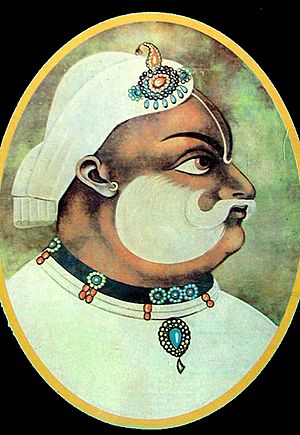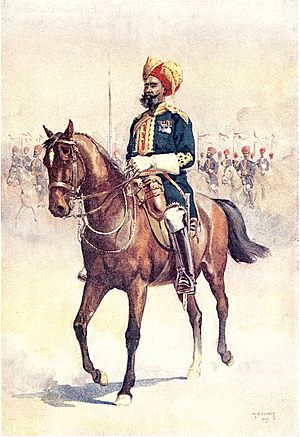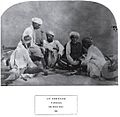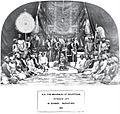Jat people facts for kids

Maharaja Suraj Mal, the 18th century Hindu Jat ruler of Bharatpur
|
|
| Regions with significant populations | |
|---|---|
| India and Pakistan | |
| Languages | |
| Haryanvi • Hindi • Punjabi • Rajasthani • Sindhi • Urdu | |
| Religion | |
| Hinduism • Islam • Sikhism |
The Jat people are a large community mainly found in Northern India and Pakistan. They have traditionally been involved in agriculture, meaning they are farmers. Long ago, they were pastoralists, which means they raised animals, in the lower Indus River valley in a region called Sindh.
Over time, the Jats moved north. They settled in areas like the Punjab region, Delhi, Rajasthan, and the western Gangetic Plain. This happened during the late medieval period. Today, Jats follow different religions, mainly Hinduism, Islam, and Sikhism. You can find them in Indian states like Haryana, Punjab, Delhi, Rajasthan, and Uttar Pradesh. In Pakistan, they live in the provinces of Punjab and Sindh.
In the 1600s, the Jat community saw big changes. Hindu Jats fought against the Mughal Empire. A famous Jat ruler was Maharaja Suraj Mal of Bharatpur, who lived from 1707 to 1763. His kingdom was very strong during his rule. Jats in the Punjab region also played a key role in creating the Khalsa Panth, a special group within Sikhism. These Jats are often called Jat Sikhs.
By the 1900s, Jats who owned land became very important in many parts of North India. This included places like Haryana, Punjab, Western Uttar Pradesh, Rajasthan, and Delhi. Many Jats later moved from farming to jobs in cities. They used their strong economic and political power to gain a higher social standing.
Jats in the Military
Many Jat people serve in the Indian Army. They are part of famous groups like the Jat Regiment, Sikh Regiment, Rajputana Rifles, and the Grenadiers. Jats have won many top military awards for their bravery. Jats also serve in the Pakistan Army, especially in the Punjab Regiment.
The British rulers in India, known as the British Raj, called the Jat people a "martial race". This meant the British thought Jats were excellent soldiers. So, they preferred to recruit them into the British Indian Army. Jats fought in both World War I and World War II as part of this army. After 1881, the British changed their rules. To join the army, Jats often had to say they were Sikh. This was because the British believed Hindus were not as good for military service at that time.
Images for kids
-
Jat Sikh of the "Sindhoo" clan, Lahore, 1872
-
The Hindu Jat Maharaja of Bharatpur, 1882
-
The Sikh Jat Maharaja of Patiala, 1898
-
Chaudhary Charan Singh, the first Jat Prime Minister of India, with his wife, on his way to address the nation at the Red Fort, Delhi, Independence Day, 15 August 1979.
-
A contingent of the Jat Regiment of Indian Army, during the Republic Day parade
-
The durbar of the teenage Hindu Jat ruler of Bharatpur, a princely state in Rajasthan, early 1860s.
See also
 In Spanish: Jat para niños
In Spanish: Jat para niños









